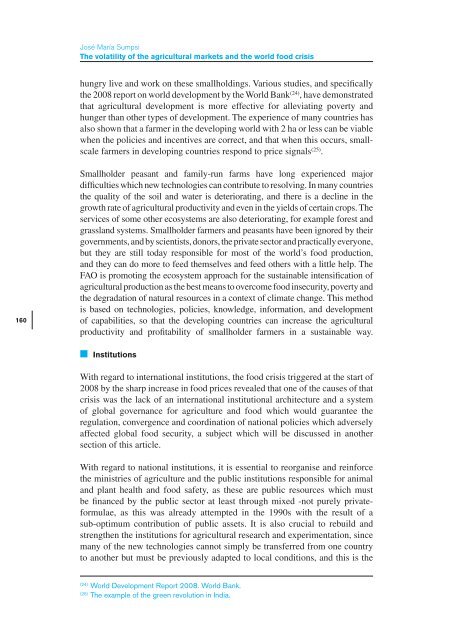Food security and global security - IEEE
Food security and global security - IEEE
Food security and global security - IEEE
- No tags were found...
Create successful ePaper yourself
Turn your PDF publications into a flip-book with our unique Google optimized e-Paper software.
José María SumpsiThe volatility of the agricultural markets <strong>and</strong> the world food crisishungry live <strong>and</strong> work on these smallholdings. Various studies, <strong>and</strong> specificallythe 2008 report on world development by the World Bank (24) , have demonstratedthat agricultural development is more effective for alleviating poverty <strong>and</strong>hunger than other types of development. The experience of many countries hasalso shown that a farmer in the developing world with 2 ha or less can be viablewhen the policies <strong>and</strong> incentives are correct, <strong>and</strong> that when this occurs, smallscalefarmers in developing countries respond to price signals (25) .160Smallholder peasant <strong>and</strong> family-run farms have long experienced majordifficulties which new technologies can contribute to resolving. In many countriesthe quality of the soil <strong>and</strong> water is deteriorating, <strong>and</strong> there is a decline in thegrowth rate of agricultural productivity <strong>and</strong> even in the yields of certain crops. Theservices of some other ecosystems are also deteriorating, for example forest <strong>and</strong>grassl<strong>and</strong> systems. Smallholder farmers <strong>and</strong> peasants have been ignored by theirgovernments, <strong>and</strong> by scientists, donors, the private sector <strong>and</strong> practically everyone,but they are still today responsible for most of the world’s food production,<strong>and</strong> they can do more to feed themselves <strong>and</strong> feed others with a little help. TheFAO is promoting the ecosystem approach for the sustainable intensification ofagricultural production as the best means to overcome food in<strong>security</strong>, poverty <strong>and</strong>the degradation of natural resources in a context of climate change. This methodis based on technologies, policies, knowledge, information, <strong>and</strong> developmentof capabilities, so that the developing countries can increase the agriculturalproductivity <strong>and</strong> profitability of smallholder farmers in a sustainable way.■■InstitutionsWith regard to international institutions, the food crisis triggered at the start of2008 by the sharp increase in food prices revealed that one of the causes of thatcrisis was the lack of an international institutional architecture <strong>and</strong> a systemof <strong>global</strong> governance for agriculture <strong>and</strong> food which would guarantee theregulation, convergence <strong>and</strong> coordination of national policies which adverselyaffected <strong>global</strong> food <strong>security</strong>, a subject which will be discussed in anothersection of this article.With regard to national institutions, it is essential to reorganise <strong>and</strong> reinforcethe ministries of agriculture <strong>and</strong> the public institutions responsible for animal<strong>and</strong> plant health <strong>and</strong> food safety, as these are public resources which mustbe financed by the public sector at least through mixed -not purely privateformulae,as this was already attempted in the 1990s with the result of asub-optimum contribution of public assets. It is also crucial to rebuild <strong>and</strong>strengthen the institutions for agricultural research <strong>and</strong> experimentation, sincemany of the new technologies cannot simply be transferred from one countryto another but must be previously adapted to local conditions, <strong>and</strong> this is the(24)World Development Report 2008. World Bank.(25)The example of the green revolution in India.
















